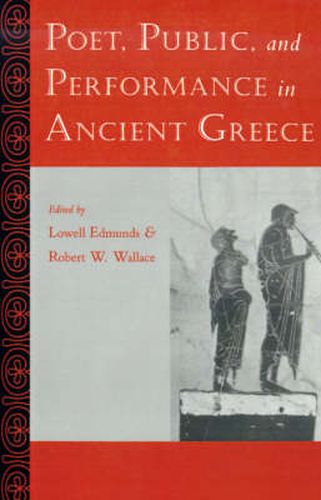Readings Newsletter
Become a Readings Member to make your shopping experience even easier.
Sign in or sign up for free!
You’re not far away from qualifying for FREE standard shipping within Australia
You’ve qualified for FREE standard shipping within Australia
The cart is loading…






Poetry in archaic and classical Greece was a practical art that arose from specific social or political circumstances. The interpretation of a poem or dramatic work must therefore be viewed in the context of its performance. In this volume, Lowell Edmunds and Robert W. Wallace bring together a group of contributors to reconstruct the performance context of a wide array of works, including epic, tragedy, lyric, elegy and proverb. Analyzing the passage in the Odyssey in which a collective delirium comes over the suitors, Giulio Guidorizzi reveals how the poet describes a scene that lies outside the narrative themes and diction of epic. Antonio Aloni offers a reading of Simonides’ elegy for the Greeks who fell at Plataea. Lowell Edmunds interprets the so-called Seal of Theognis as lying on a borderline between the performed and the textual. Taking up proverbs, maxims, and apothegms, Joseph Russo examines the performance of wisdom . Charles Segal focuses on the unusual role played by the chorus in Euripides’ Bacchae . Reading the plot of Euripides’ Ion , Thomas Cole concludes that the task of constructing the meaning of the play is to some extent delegated to the public. Robert Wallace describes the performance of the Athenian audience and provides a catalogue of good and bad behaviour: whistling, shouting, and throwing objects of every kind. Finally, Maria Grazia Bonanno stresses the importance of performance in lyric poetry.
$9.00 standard shipping within Australia
FREE standard shipping within Australia for orders over $100.00
Express & International shipping calculated at checkout
Poetry in archaic and classical Greece was a practical art that arose from specific social or political circumstances. The interpretation of a poem or dramatic work must therefore be viewed in the context of its performance. In this volume, Lowell Edmunds and Robert W. Wallace bring together a group of contributors to reconstruct the performance context of a wide array of works, including epic, tragedy, lyric, elegy and proverb. Analyzing the passage in the Odyssey in which a collective delirium comes over the suitors, Giulio Guidorizzi reveals how the poet describes a scene that lies outside the narrative themes and diction of epic. Antonio Aloni offers a reading of Simonides’ elegy for the Greeks who fell at Plataea. Lowell Edmunds interprets the so-called Seal of Theognis as lying on a borderline between the performed and the textual. Taking up proverbs, maxims, and apothegms, Joseph Russo examines the performance of wisdom . Charles Segal focuses on the unusual role played by the chorus in Euripides’ Bacchae . Reading the plot of Euripides’ Ion , Thomas Cole concludes that the task of constructing the meaning of the play is to some extent delegated to the public. Robert Wallace describes the performance of the Athenian audience and provides a catalogue of good and bad behaviour: whistling, shouting, and throwing objects of every kind. Finally, Maria Grazia Bonanno stresses the importance of performance in lyric poetry.